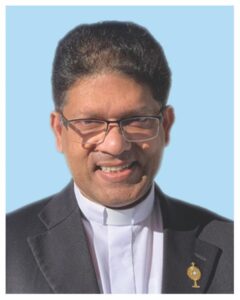
In today’s Gospel reading, St. Mark describes that Jesus was sitting at the Temple treasury, watching people making offerings to the temple. Many rich people donated large sums of money and then a poor widow deposited two small coins which were not much valued. But Jesus proclaims that her contribution is greater because she gives “everything she had, her whole living” (Mk. 12:44). This woman is not only an example of exceptional generosity but also a model of great faith.
The Temple of Jerusalem was at the center of Jewish life and religion. The Jews believed that the Temple united them with heaven. So, the people of Israel made pilgrimages to the Temple at least three times every year. The Gospel does not say whether this widow came as a pilgrim or lived around the temple premises. These collection boxes in the Temple were built with heavy metals. When the rich people deposited valuable coins, they created much noise, and everyone instantly noticed it. The donors enjoyed satisfaction from the envious look of the people. But when the widow deposited two small copper coins, they neither made any noise nor did anyone notice it.
The donation of the widow, not making much noise, is symbolic of her life. Society did not give much value to her, and no one cared whether this woman lived among them. But now her small coins created some noise in heaven when Jesus noticed her. Prophet Isiah writes: “The lowly shall again find joy in the LORD, the poorest rejoice in the Holy One of Israel” (Isiah 29:19). During this era, a widow had to depend on her son or male relatives for her survival. When she had no family, she had to submit herself to the charity of others. The Bible describes orphans and widows as God’s own special people. When they lose their earthly support, God remains their Spouse and Parent. A percentage of the tithes from the people were spent on the needs of such people. For Jesus, the poor condition of the window shows the failure of society, especially that of the authorities.
Lawrence was a prominent deacon in the early Church. He was born in Valencia, Spain, and traveled to Rome with his Greek teacher Sixtus. When Sixtus II became pope, young Lawrence was appointed a deacon. He was also in charge of the treasury of the Church. Sixtus and four deacons were executed while offering the Holy Mass in the catacombs. Then the Roman Prefect asked Lawrence to hand over the treasures of the Church, expecting a large sum of money. He requested three days for this and then went back to distribute everything to the poor. On the third day, he appeared before the Prefect with a small delegation. St. Lawrence presented the crippled, the blind, and the suffering and declared: “The Church is truly rich, far richer than your emperor.” Lawrence was tied on top of an iron grill and thus received the crown of martyrdom on 10 August 258.
It is the faith and prayer of the people like the widow that sustains the life of our Church. Pope Francis told a gathering of five thousand journalists in 2013: “How I would like a church that is poor and for the poor.” Our present-day situation might be different from that of Jesus. But still, there are so many people around us who need our emotional and spiritual support, like that of the widow. We need to realize that the value of our lives is worth more than our money and possessions. Like Jesus, we need a loving heart to treat everyone equally. Like the widow, we need a virtuous life and great confidence in the loving providence of our God.
Rev. Dr. Mathew Charthakuzhiyil



